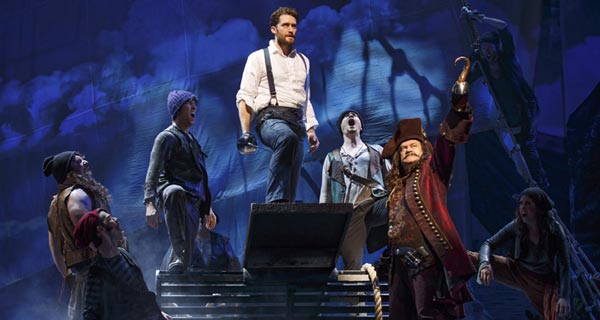Finding Neverland
Lunt-Fontanne Theatre
5 Stars
BOOK TICKETS
Celebrated playwright J.M. Barrie has writer’s block. Under pressure to produce a new play by his pushy American producer, he is struggling for new directions. He has befriended four boys whose father died unexpectedly the previous year. He has silly adventures with them in Kensington Gardens, playing pirates and Cowboys and Indians and the like, escaping his own life while helping them see the way to move on in their own lives, especially Peter, the one of the four who is trying hardest to put his childhood behind him, to enter the adult world early because he thinks adults feel pain less.
One day Barrie has been playing hard with the boys and has brought them home where they need to go to bed. They are very excitable and their restless energy pushes them into hyper-activity. In an instant, without warning, Barrie sees the world differently, and so do we. A star field covers the stage and suddenly, impossibly, the boys are flying as they play. As enchanting moments of unexpected theatrical surprise go, this moment, when the seeds of the adventures of Peter Pan and the Lost Boys are sown, is very high on the rapture ladder. No one breathes while those boys fly, no one makes a sound. The encapsulation of pure, astonishing wonder is too perfect, too momentous for even a heartbeat of it to be missed.
Harvey Weinstein has been a champion of adapting the successful film, Finding Neverland, for the musical theatre stage. A few seasons ago a quite beautiful version was mounted at the Leicester Curve but Weinstein was not happy with it and decided upon starting the project afresh with a new creative team. The result of that decision is now in previews at the Lunt-Fontanne Theatre.
It is a curious, true tale. Before he wrote Peter Pan, J.M. Barrie met and formed a close, some consider unhealthy, relationship with Sylvia Llewellyn Davies, a widow, and her four boys. One of those boys, Peter, was part of the inspiration for the character of the boy who never grew up. Sylvia died while the boys were young, and Barrie provided for them as if he was their own father, an act that was not without consequences for Barrie. That framework is embellished and augmented here, but none of the power of the consequences of the choices made by the central characters is diminished. Overwhelmingly, this is a story about pure love, pure imagination and pure genius.
Walt Disney always sought to create magic, to thrill, to enchant, to expose emotions, when making films for children, both young and old. Disney would be proud of Weinstein’s persistence and the achievement of the extraordinary Diane Paulus (direction), James Graham (book), Gary Barlow and Eliot Kennedy (score and lyrics), David Chase (music supervision), Simon Hale (orchestrations), Scott Pask (set), Suttirat Anne Larlarb (costumes), Kenneth Posner (lighting), Jonathan Deans (sound), Paul Kieve (Illusions) and Mary-Mitchell Campbell (conductor) – each and every one of them.
Because Finding Neverland is a truly magical musical theatre experience. Truly. Magical.
The score is lively and quite quite beautiful. From ballads to raucous boy songs and big, generous ensemble pieces, plus an exceptional anthem or two – Barlow and Kennedy really deliver the goods. There is a marvellous number in the second Act, Play, which nearly stops the show – indeed, if the orchestration was more definite and powerful as the song ends, it definitely would. The numbers you want to hear again and again come thick and fast: Believe, We Own The Night, All That Matters, Sylvia’s Lullaby, Neverland, Circus Of Your Mind, Stronger, What You Mean To Me and the superb When Your Feet Don’t Touch The Ground. The whole score has a shape, a sonority which works perfectly with the period in which the narrative is set, but which feels fresh and enthusiastically alive.
Graham’s book is splendidly theatrical and direct. There are theatre jokes, meta references, and knowing colloquial nods; but, more than that, he tells the sad tale of the Llewellyn Davies boys crisply and cleanly, without resorting to mawkish sentiment. Cleverly and with tremendous heart, Graham details how the boys heal Barrie and cure his writer’s block while, simultaneously, he heals them and helps them through their tragic losses.
Against that very personal, very complicated emotional story, Graham imagines the highly theatrical world of the theatre and those who populate it – the producer, the actors, the stage management, the crew. In separate ways, life is given to imagination and the parallel delineation of how that transpires is carefully, humorously and bravely done. Delicately drawn characterisations, clever and brisk scene setting, a slow burning fuse of pain as tragedy unfolds and possibilities of redemption open up – Graham writes with insight and awareness, producing a book which is endlessly surprising and satisfying. It might well be his best work for the stage.
Paulus ensures that the sense of wonder and magic is permanently in focus, whether it is the flying antics of various characters, the sudden dramatic (and wholly unexpected appearance of Captain Hook), the way fairies and Tinkerbell are represented, the beguiling work of the child actors, the creation of Captain Hook’s ship out of nothing, or the absolutely breathtaking scene where Sylvia departs the mortal world in a shower of glittering, windy enchantment. Everything about the way the piece is staged is scintillating, exciting and involving. It will be a hard heart indeed who is not in tears for a large part of the second Act, so true and raw and completely understandable are the sincere expressions of joy and pain on the stage. Paulus is a genius. Indisputably.
Scott Pask’s basic set is quite remarkable, combining the sense of Kensington Gardens, the concept of writing, the notion of theatre and various aspects of the Peter Pan story into one fixed colourful box set. He adds detailed flats, richly decorated, or beautiful back cloths to create various spaces. The boys’ bedroom naturally evokes, and then becomes, the bedroom where the Darling children reside. The scene where the boys attempt to stage Peter’s play is simple and clever and the backstage theatre scene where Barrie and Sylvia admit their attraction and shadow dance is just entrancing, helped in no small degree by Posner’s splendid lighting. The show looks as beautifully textured as the score sounds.
The young men who played the Llewellyn Davies boys were simply terrific. Aidan Gemme captured the lost nature of Peter’s soul admirably, as well as his anger and resentment, all of which melted away under the care bestowed by Matthew Morrison’s Barrie. He has a sweet, true voice and a compelling stage presence. Alex Dreier made a splendidly rambunctious Michael and Sawyer Nunes a gentle, but firm, George. His embarrassment about his girl’s beautiful smile and the way he put his grandmother in her place were moments of truth acutely realised. Effervescent and tricksy, Christopher Paul Richards was a perfect Jack.
Together the four were quite believable as brothers, their camaraderie and rivalry excellently conveyed. There was no false swagger about any of them; four gifted, natural and sincere talents.
Carolee Carmello is gloriously formidable as the matriarch of the Llewellyn Davies household. She sings as marvellously as ever, her tone rich and rapturous, her notes ringing and pure. She starts off as a very tough cookie, but the plutonium exterior dissipates over the course of the play and she ends up being her daughter’ mother and her grandsons’ grandmother – it’s a beautifully thought through performance.
As the tragic Sylvia, Laura Michelle Kelly is beautiful and swathed in grace. Maternal and loving, her Sylvia is totally gorgeous. She sings with a lustrous and clear tone, her pure expressive top notes are thrilling. Her rapport with Morrison is exceptional and carefully built up to the stunning shadow dance sequence. She is excellent with the boys too and her warmth starts the process which unleashes Carmello’s inner benign granny. Kelly is a complete treat.
So too is Kelsey Grammar who plays the feisty, demanding Charles Frohman, the producer who is desperate for a new play from Barrie. He is hilarious – “Children are like soufflés: useless until they are raised” – and takes the part with both hands and shakes every nuance and titter from the role. About two-thirds of the way through Act One, one briefly wonders why he took the part, but then there is a twist which makes it all perfectly understandable. As Barrie’s conceptualisation of Captain Hook, Grammar is outstandingly good. He sings as well as he acts, with glee, aplomb and true style.
The ensemble is uniformly terrific, with standout performances from Chris Dwan, Josh Lamon, Paul Slade Smith and Jack as the crowd pleasing pooch, Porthos.
Without question, though, the star here is Matthew Morrison, who gives a boundlessly energetic turn as the troubled playwright J.M.Barrie. Curiously using a good Scottish brogue for dialogue but dropping it for singing, Morrison brings gravitas and intensity to every scene. It’s a totally committed performance, aflood with charm and that ineffable paternal sweetness that good fathers require. His work with the boys is wonderful to watch (those Glee years paying off in spades) as is his chemistry with Grammar, Kelly and Caremllo. He is funny and astute, dances with vigour and dexterity, and sings with a booming, assured, high-baritone that is full blooded and unerring. This role represents a transition for Morrison, from accomplished supporting actor to true Broadway lead. As J.M. Barrie, he is better than he has ever been.
This season sees Broadway cover a wide gamut of styles in new musicals. Something Rotten is the infectiously hilarious one; An American In Paris is the sumptuously dance-driven, romantic one; Hamilton, the genre challenging, exciting one; Fun Home, the intellectually satisfying one; It Shoulda Been You, the charming, sweet one; Dr Zhivago, the exotic romance; and The Visit, an example of form being challenged by content.
Finding Neverland is the magical one; the one that will nourish and release your inner child. Don’t keep your inner child imprisoned – fly to get a ticket. Sell your shadow if necessary.

